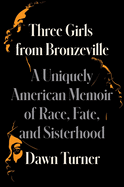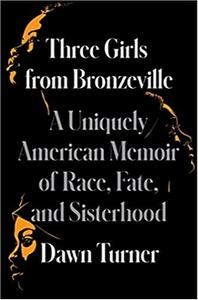
 Journalist and novelist Dawn Turner (Only Twice I've Wished for Heaven; An Eighth of August) has spent her career writing about the intersections of politics, race and class in Chicago and across the United States, including coverage of Barack Obama's 2008 campaign. In Three Girls from Bronzeville: A Uniquely American Memoir of Race, Fate, and Sisterhood, those same connections become the lens through which Turner explores her own childhood memories, as well as those of her sister and childhood best friend, whose lives started so similarly and diverged in remarkable and heartbreaking ways over the decades.
Journalist and novelist Dawn Turner (Only Twice I've Wished for Heaven; An Eighth of August) has spent her career writing about the intersections of politics, race and class in Chicago and across the United States, including coverage of Barack Obama's 2008 campaign. In Three Girls from Bronzeville: A Uniquely American Memoir of Race, Fate, and Sisterhood, those same connections become the lens through which Turner explores her own childhood memories, as well as those of her sister and childhood best friend, whose lives started so similarly and diverged in remarkable and heartbreaking ways over the decades.
"To understand Debra, Kim and me--to understand what will happen to us," writes Turner in the introduction, "you have to know the place that has begun to shape us." That place is Bronzeville, a historic Chicago community known as the "cradle of the city's Great Migration, the epicenter of Black business and culture." This three-square-mile community is the setting of Turner's story--and life--as the neighborhood is increasingly affected by systemic disinvestment, racially motivated policing and the opioid epidemic. Against that backdrop, Turner recalls growing up with her younger sister, Kim, and best friend, Debra, doing the things kids do: sneaking notes in classes, making up adventures in the neighborhood, trying to do right by their parents. Somewhere along the way, though, their three paths diverged: Turner, heading to college and marriage and a successful career; Kim, struggling with alcoholism and dead of a heart attack at far too young an age; and Debra, caught in the throes of addiction and sent to jail for murder.
This divergence forms the central tension of Three Girls from Bronzeville, as Turner attempts to understand how three young Black girls with such similar childhoods could have such dramatically different fates. Turner's exploration ties back again to Bronzeville's past and present, as she comes to the realization that Kim and Debra's paths were shaped as much by circumstance and opportunity--or lack thereof--as by their own individual decisions. "Debra and Kim didn't have to dream my dreams," she writes. "I just wanted them to have--and make--better choices."
Turner's vivid recollections of her girlhood in Bronzeville ground Three Girls from Bronzeville in the experiences of those in the Chicago neighborhood, as Turner expertly combines memoir and social history in her analysis of the many systems that made Bronzeville into the place it is today--and how those same oppressive systems shape the lives of even society's youngest neighbors. --Kerry McHugh, blogger at Entomology of a Bookworm
Shelf Talker: A seasoned journalist turns an incisive lens on her own past to understand how race, politics and class shaped the lives of three young Black girls.

